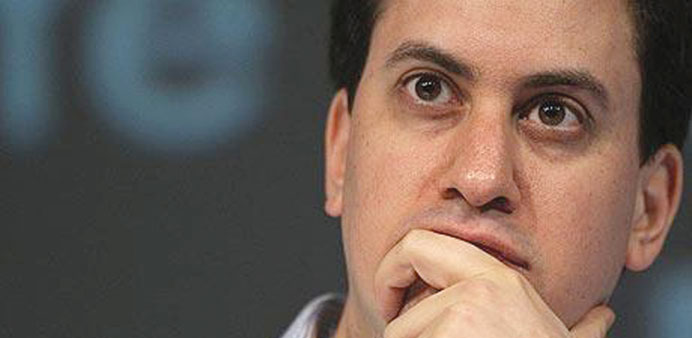Reuters/London
Britain’s opposition Labour Party has taken a four point lead over Prime Minister David Cameron’s Conservatives after the first TV encounter of an unusually close-fought national election, an opinion poll showed yesterday.
The poll is a morale boost for Labour and its leader Ed Miliband, and prompted party strategists to say it showed they could win an outright majority on May 7.
Miliband’s earnest personality is mocked by the country’s mainly right-leaning press, and the left-wing party hopes voters will see past caricatures and warm to him during the campaign.
“As the polls this morning indicate, this is a winnable election for Labour,” Douglas Alexander, Labour’s campaign chairman, told the BBC’s Andrew Marr Show.
“It is difficult, but it is certainly doable that we can get a majority,” he added, saying he was confident Labour could increase its support in the coming weeks.
Britain’s future in the European Union could ride on the outcome as Cameron is pledging an EU membership referendum.
The poll, by YouGov for the Sunday Times, put Labour on 36%, the Conservatives on 32%, the centrist Liberal Democrats, now in coalition with Cameron’s Conservatives, on 8%, the anti-EU UK Independence Party (UKIP) on 13%, and the Greens on 6%.
It also suggested, contrary to an earlier poll, that most Britons - by a margin of 49% to 34% - thought Miliband had performed better than Cameron in last Thursday’s first TV encounter of the campaign.
A snap poll conducted immediately afterwards suggested Cameron had won, albeit by a slimmer margin than expected.
Cameron is still far ahead when Britons are asked to say who they think would be the best prime minister and his party enjoys a commanding lead over Labour when it comes to what it hopes will be the decisive issue of economic credibility.
Polls also show Labour struggling to stem what looks like a devastating loss of support in Scotland to Scottish nationalists who have surged since losing a referendum on independence last year. That makes it harder for Labour to win outright.
But Cameron’s appearance in the first TV encounter was less assured than expected and he had to use his final debate in parliament last week to defend his surprise decision to announce he wouldn’t seek a third term in power if re-elected.
Most polls in recent months have put Labour and the Conservatives neck-and-neck, though both have briefly notched up leads of up to four points only to see them swiftly evaporate.
YouGov’s Joe Twyman said yesterday’s poll showed the TV encounter had given Labour momentum ahead of what is regarded as the formal start of the campaign on Monday.
“The big question is whether this is a talking point or a turning point. Will they be able to make it stick and turn the momentum into sustained gains?” he said.
The Scottish National Party pledged Saturday to “shake up” the British parliament if they seize the balance of power at the general election in May.
SNP leader Nicola Sturgeon said her pro-independence party would act in the interests of left-wingers across the United Kingdom if they are in a position of influence after the May 7 polls.
Scotland’s first minister used her speech to reach out to people in the rest of the United Kingdom with a “message of friendship and solidarity”.
“I won’t pretend that the SNP doesn’t still want Scotland to be independent,” she told a party conference in Glasgow, in reference to the September referendum vote to remain part of the three-centuries-old union with England.
“But... I say this to people of progressive opinion all across the UK.
“As long as Scotland remains part of the Westminster system, we will be your allies in seeking to shake up and reform that outdated and discredited system once and for all.”
Sturgeon said SNP lawmakers would “demand an alternative to slash and burn austerity” -- referring to the public spending reductions being made in a bid to balance the budget.
She said the nationalists would stand against any attempt to renew Britain’s nuclear weapons deterrent, and added it was time to abolish parliament’s unelected house of lords upper revising chamber.
At the last general election in 2010, the Labour main opposition won 41 of Scotland’s 59 seats in the British parliament’s 650-member lower house of commons, to the SNP’s six.
But following a surge in support, the nationalists are tipped to win at least 40 seats this time around, making it difficult for centre-left Labour to form a majority government.
The SNP have proposed backing a Labour minority government on a vote-by-vote basis, with prime minister David Cameron’s centre-right Conservatives claiming that would mean the separatists perpetually holding Labour to ransom.
“If you want a Labour government to have backbone and guts, you need to elect SNP MPs to provide it for them,” Sturgeon said.
“You must elect SNP MPs to force Labour’s hand and keep them honest.”

Ed Miliband
